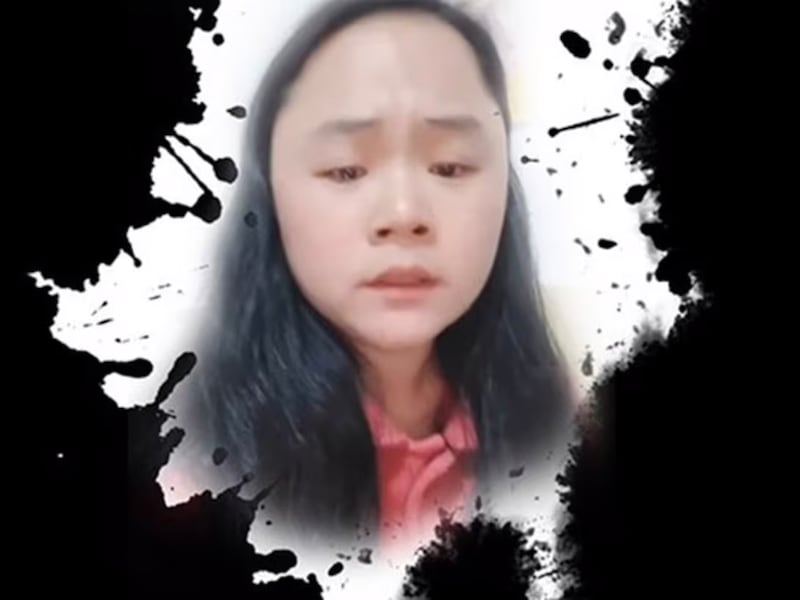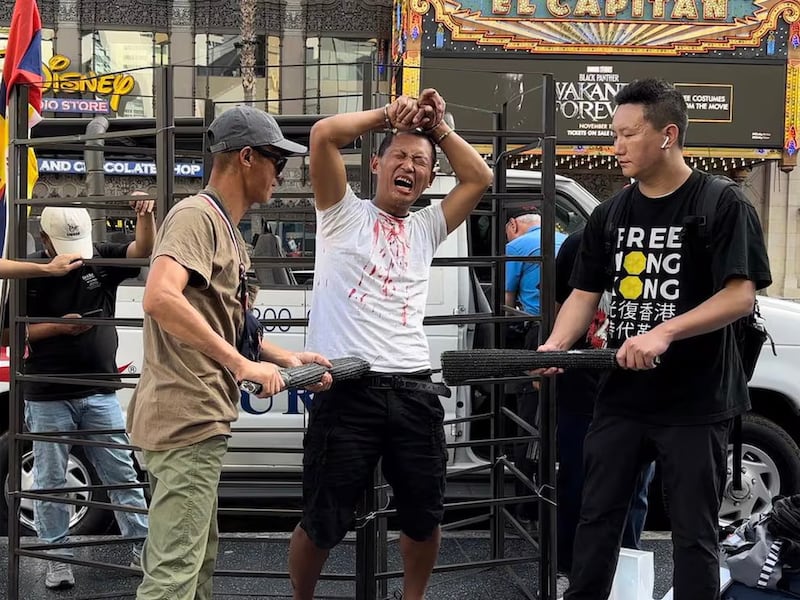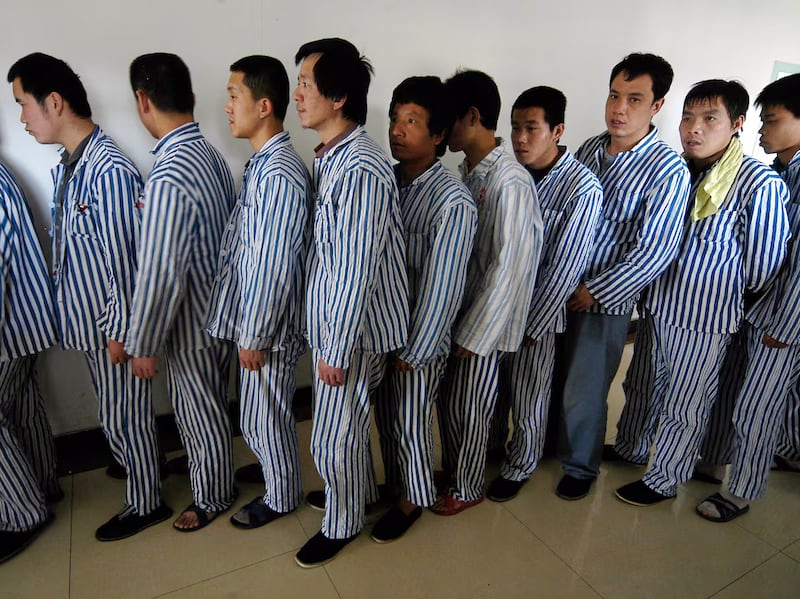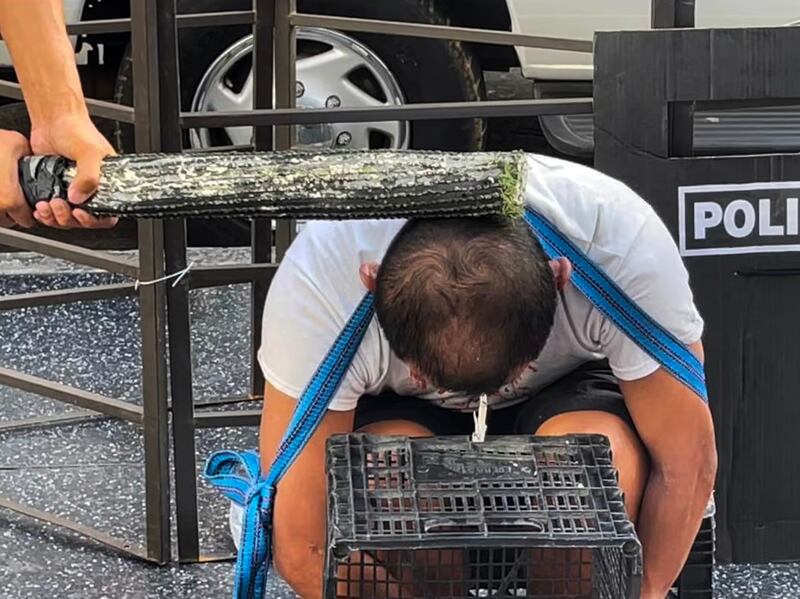The incarceration of a social media influencer in a psychiatric hospital after she accused a police officer of sexual assault has sent shockwaves through Chinese social media.
Li Yixue, who hails from the eastern province of Jiangxi and blogs via the Douyin video sharing plaform, China’s version of TikTok, was initially sent for forcible psychiatric treatment at the Jiangxi Mental Health Center in Nanchang in April 2022 after she complained of the alleged assault.
She spent 56 days there, and was re-detained in December 2024. She is apparently still being guarded by the authorities, according to a social media video posted by a fellow Douyin user on Jan. 11.
The local police department carried out an investigation that exonerated the auxiliary officer, and claimed that Li had made four public suicide attempts in 2022.
But an agitated Li told the blogger Shitou on Jan. 11 that official accounts of her detention were “fake,” and that she’d been “driven mad” by her treatment the hands of the authorities.
‘A black hole’
Li’s case is the latest in a long list of similar actions taken against people who criticize or challenge the ruling Chinese Communist Party or complain about official wrongdoing.
Lawyers and rights activists told RFA Mandarin that people sent for psychiatric incarceration can fall into a “black hole,” with fewer routes out even than prison.
“It’s a black hole, a place more terrible than prison,” U.S.-based rights lawyer Wu Shaoping said. “It can basically ignore all laws, and there’s no law that can exercise oversight in a mental hospital.”

Li’s case, which prompted a social media outcry, has once more shone a spotlight on the role of China’s psychiatric hospitals in enforcing the ruling Chinese Communist Party’s “stability maintenance” program, a nationwide series of measures aimed at containing perceived “troublemakers.”
Li’s treatment didn’t hit the national headlines until she released two short videos on Dec. 14 accusing officers from the Kuaizixiang police station in her home district of Xihu of breaking into her home and destroying a surveillance camera she had set up for her own protection.
By Dec. 21, she had been packed off to Beijing’s Anding Hospital, where she was “diagnosed” with “obsessive-compulsive disorder” and a “personality disorder” and sent back to Jiangxi for “treatment” the following day.
State broadcaster CCTV issued an update on Li’s case on Jan. 11, saying she suffered from “a severe mental disorder,” but that her father had been allowed to take her home on Jan. 10 after contesting her treatment plan.
But Li fought back, releasing a video on the same day calling for help, and saying she was being “held in a hotel by dozens of people.”
“Will they make me disappear?” she said, adding that her father had been prevented by censors from also posting a video about her treatment.
Men in black jackets
On Jan. 12, fellow social media influencer Shitou tracked Li down, but was prevented from interviewing her by the people guarding her.
This caused an altercation with unidentified men in black jackets, during which Li tried unsuccessfully to leave.
During the video, Li shouts out to the camera that the official accounts of her case were “fake,” and that she had been “driven mad” by her treatment, according to an unverified video clip posted by the X citizen journalist account “Mr Li is not your teacher.”

U.S.-based rights activist Jie Lijian, who was repeatedly incarcerated in a psychiatric hospital while he lived in China, said the authorities use psychiatric treatment as a form of illegal detention.
“These hospitals are like concentration camps or black jails where the Chinese Communist Party locks up people it doesn’t like,” Jie told RFA Mandarin in a recent interview. “They can torture you using drugs and other medical procedures, even to the point of death.”
“Even if you get out, there’s no law to protect you, and they won’t accept any complaints from you,” he said. “Because you are now a mad person, or a fool, and dead to society.”
Other cases
Li’s psychiatric incarceration isn’t the first to shock social media.
In December 2021, the incarceration of schoolteacher Li Tiantian in a psychiatric hospital after she expressed support for a sacked Shanghai journalism lecturer prompted an online outcry in China.
RELATED STORIES
Woman Who Splashed Xi Jinping Poster Sent to Psychiatric Hospital
Chinese authorities still locking up critics in psychiatric facilities: report
Incarceration of schoolteacher in psychiatric hospital prompts online outcry in China
A new Mental Health Law has banned the committal of psychiatric patients without a medical assessment and an amended Criminal Procedure Law stepped up judicial oversight requirements where police commit people to psychiatric care.
But police and government agents continue to arbitrarily send petitioners and activists for “mental health” treatment, rights groups say.
The incarcerations take place both at general medical facilities, and within the network of police-run Ankang hospitals designed to house criminals and suspects with alleged “mental health conditions,” according to a 2022 report from the Spanish-based Safeguard Defenders, which said victims can stay in these institutions for months and years, or be sent back repeatedly.

“The Chinese Communist Party’s Mental Health Law gives too much power to the authorities and there’s a lack of oversight, so anyone can become a victim,” U.S.-based rights lawyer Wu Shaoping told RFA Mandarin.
“It’s not that they don’t know what they’re doing -- they want to hold all of the power,” he said. “They can make anyone mentally ill, arbitrarily.”
Once that happens, there is no legal comeback for the person, Wu said, adding that there are also financial incentives for hospitals to take such “patients.”
“Legally speaking, a person identified as mentally ill has no capacity or limited capacity as a citizen,” he said. “Their right to defend themselves has been taken away by society.”
No second opinions
China’s Mental Health Law does allow the patient or their family to request a second opinion, but the majority of doctors in the system will still do as the government wants.
“Even if you get a second opinion, you may not actually get an objective one; it’s very unlikely,” he said.
Many victims of psychiatric incarceration -- who include petitioners, dissidents, outspoken social media critics and large numbers of people who follow the banned Falun Gong spiritual movement -- are held in a network of police-run hospitals identifiable by the name “Ankang” in their title.
In a nationwide meeting in 2010, the Ministry of Public Security issued a directive requiring each Chinese province to build at least one Ankang hospital to “strengthen the supervision of the mentally ill,” Japan-based current affairs commentator Heng he told RFA Mandarin.
“All the hospitals run by the public security departments in each province are named Ankang Hospitals,” Heng said. “It’s pretty clear that this is human rights persecution, 100%. This is part of the police system.”
The system is hugely convenient for the police, in a way that the now-abolished “re-education through labor” camps once were, he said.
“Hospitals basically take the view that if the police send you in, they are legally obliged to take you,” Heng said. “If they send you, the doctors won’t diagnose you, because you already have a diagnosis, and you will be treated accordingly.”
Falun Gong crackdown
The practice really took off with the crackdown on the Falun Gong movement that started in 1999, according to Wang Zhiyuan, who heads the U.S.-based Coalition to Investigate the Persecution of Falun Gong.
The group says “hundreds” of psychiatric hospitals detained and persecuted Falun Gong followers between July 1999 and the end of 2003.
Thousands of mentally normal practitioners at the very least were detained in mental hospitals and drug rehabilitation centers, and tortured by psychotropic drugs and electric shocks, and hundreds died, Wang told RFA Mandarin.
“From the data we have available, we can see that every psychiatric hospital took part in the persecution of the Falun Gong,” he said. “Now they are using this on the rest of society too.”
Li’s case prompted a similar video from traditional Chinese medicine doctor Zhang Guiyun, who said she had been sent to a psychiatric facility for 18 days by local officials after she lodged an official petition with the ruling Chinese Communist Party’s disciplinary arm.
“I went to the Central Commission for Discipline Inspection to report this issue, stage by stage, from May 9-20, 2023,” Zhang said. “Once I’d done this, I was picked up at the gate ... and sent to the Zhuozhou Ankang Psychiatric Hospital for no reason ... and illegally detained there for 18 days.”

Zhang said she was forced to take psychiatric drugs and was even threatened with a gastric tube. The hospital also asked her to write a “confession” and promise not to pursue her official complaint.
Her brother and sister-in-law were also forced to sign a statement saying that she had a “paranoid mental disorder” caused by her participation in an “illegal religion.”
Even social media posts can land a person in an institution, as Dong Yaoqiong found when she splashed black ink on a poster of Chinese President Xi Jinping in 2018.
Li Yixue’s case has resonated with so many people because everyone knows that the same thing could happen to them, Wu Shaoping said.
“I think everyone is looking at Li Yixue’s experience and thinking the same thing: will I be next?”
Translated by Luisetta Mudie. Edited by Malcolm Foster.
